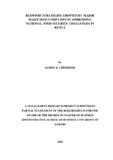| dc.description.abstract | In changing market environment, business firms are exposed to various external factors that jeopardize the very existence of the company. These changes come from government regulatory moves, changing environmental conditions, general business environment and rapid changes in the technology. In addition, the frequency of occurrence of these changes has become unpredictable and that chance to predict and prevent their occurrences is lessening day-to-day. Consequently, firms should come up with appropriate strategies that will address a problem existing to create an opportunity for them. The research objective was to determine the response strategies employed by major seed companies in addressing food challenge in Kenya. The specific objectives were to determine how access to market and marketing practices, provision of extension services and production of certified seeds was applied in addressing the food challenges in Kenya. Towards explaining the research objective, the study adopted the Resource - Based View and the Dynamic Capability theory. The research design adopted was cross-sectional with the population of the study being the 10 major seed companies that operate in Kenya. The main data collection instrument was a questionnaire that consisted of both the open and closed ended questions that was administered through a drop and pick latter system. The target respondents to the study were field managers for specific maize varieties, business development managers and the marketing managers. Data was analyzed using descriptive measures of mean and standard deviation while presentation of the findings was done using tables and graphs. The study established that the common challenges facing food production and therefore food security include poor seed varieties, changing climatic condition and unpredictable rainfall. The findings also indicate that the seed companies have entered into partnership with government and multinational agencies with an aim of connecting farmers to markets locally and outside the country. In addition, the seed companies were found to provide extension services to farmers as well provide climate condition tolerant seed varieties in the country. A strong correlation was found between the seed quality and provision of extension services to the farmers. This was also evident in the regression model that shows a significant relationship between the variables. The study recommends that due to the significance of the variables to the food security goal, the firms and government agencies were encouraged to facilitate extensive training opportunities, especially to the small scale farmers. The study was limited to its descriptive nature of its research design and therefore suggested adoption of more inferential analysis in another study in the same line. | en_US |



